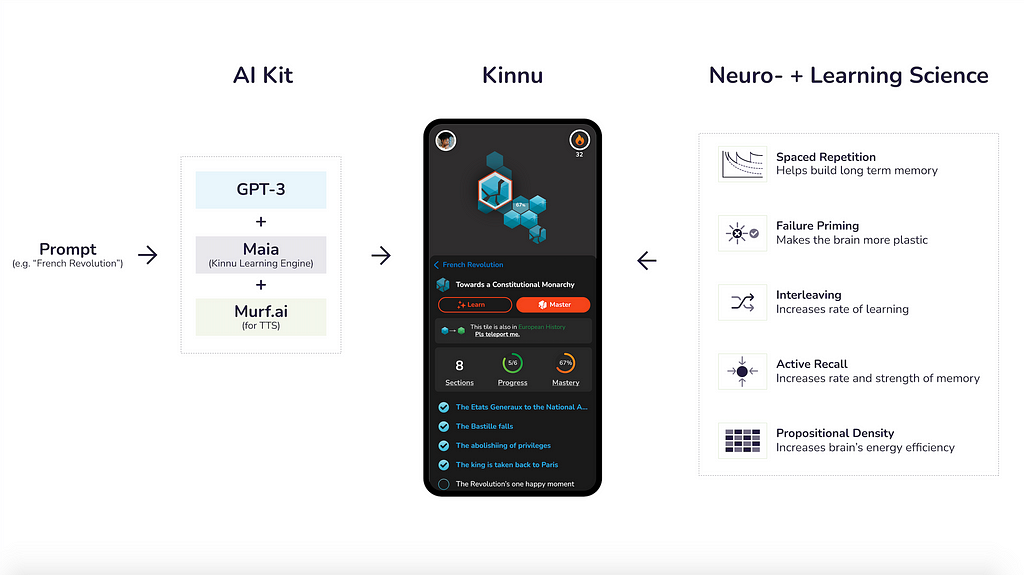
This AI newsletter is all you need #17
Last Updated on October 24, 2022 by Editorial Team
Author(s): Towards AI Editorial Team
Originally published on Towards AI the World’s Leading AI and Technology News and Media Company. If you are building an AI-related product or service, we invite you to consider becoming an AI sponsor. At Towards AI, we help scale AI and technology startups. Let us help you unleash your technology to the masses.
What happened this week in AI by Louis
Designer was announced this week. A DALLE-powered product by Microsoft for creating designs with AI’s help. It’s a similar platform to Canva but uses even more AI to generate custom images rather than pre-available ones. I believe it is just the first of many to use generative AI in a product, just like all the GPT-3-based companies that were created.
The gist of Designer is to spam for generations until you get the right one, as the results are not perfect, especially not on the first run, which is one approach of AI design companies. The other option would be to wait for the perfect results before using it, so the user doesn’t have to work.
I’d love to know about your preferred approach for creating AI-based content. Would you mind having to click refresh a few times before getting something great, or would you rather wait indefinitely for a model that provides good-looking results every time? Another question is: would you rather have an AI you can spam for generations, or get only generations “approved” by a real/trustable designer/artist to give you confidence that the generation does indeed look great? I know that some of us (like me) have a pathetic eye for design quality.
Hottest News
- An AI Music Generator based on Diffusion!
StabilityAI, the company behind Stable Diffusion, announced an “AI Music Generator” called Harmonai based on the “Dance Diffusion” Model, which is basically a stable diffusion model for generating sound instead of images. - Designer, a Microsoft AI design app powered by OpenAI’s DALL-E 2
Yes, Microsoft is opening up access to a Canva-like web app for free to users on a waitlist. Just type in a text description of the image you want, and the AI will generate examples that they can add to your design. This is pretty scary news for Canva and Adobe! - A podcast entirely generated by artificial intelligence
“Every week, we explore a new topic in depth, and listeners can suggest topics or even guests and hosts for future episodes. Whether you’re a machine learning enthusiast, just want to hear your favorite topics covered in a new way or even just want to listen to voices from the past brought back to life, this is the podcast for you.”
Most interesting papers of the week
- EVA3D: COMPOSITIONAL 3D HUMAN GENERATION FROM 2D IMAGE COLLECTIONS
“EVA3D, an unconditional 3D human generative model learned from 2D image collections only able to sample 3D humans with detailed geometry and render high-quality images (up to 512×256) without bells and whistles (e.g. super-resolution).” - UNDERSTANDING HTML WITH LARGE LANGUAGE MODELS
“We show that LLMs pretrained on standard natural language corpora transfer remarkably well to HTML understanding tasks.” - Reconstructing Personalized Semantic Facial NeRF Models From Monocular Video
A novel semantic model for the human head defined with a neural radiance field. The 3D-consistent head model consists of a set of disentangled and interpretable bases, and can be driven by low-dimensional expression coefficients.
Enjoy these papers and news summaries? Get a daily recap in your inbox!
This week we would like to highlight an exciting new AI application from our friends at Kinnu:
In a collaboration with Deepmind’s head of product, a new startup is using artificial intelligence to increase human intelligence.
A new learning startup called Kinnu is implementing AI to find “cognitive shortcuts” and increase the effectiveness of human learning. They see the future of accelerated learning as a melding of neuroscience and AI. They’re testing the approach with a free course on AI, co-authored with Deepmind’s very own head of product. Kinnu is also experimenting with entirely AI-generated learning material (check out the French Revolution course to see what that looks like). Is this the future of education, like Dall-E for learning content?

The Learn AI Together Community section!
Meme of the week!

Featured Community post from the Discord
One of our members just started a personal project I definitely support: writing!
The user in question, friscons93#3360 (or Davide), just published his first article ever:
“I just wanted to share with you my first data science article on medium: it’s about aqueous solubility prediction of drugs by using Machine Learning and PCA.” Read Davide’s article!
AI poll of the week!

TAI Curated Section
Articles of the week
Outline a Smaller Class With the Custom Loss Function by Konstantin Pluzhnikov
The accuracy metric may not always be adequate to produce the desired results. We could want to lower the rate of false positives or false negatives. When a dataset is unbalanced, and the answer we’re looking for falls into a narrower class, it can be useful. The author gives an overview of how to maximize classification while working with unbalanced datasets.
Our must-read articles
How To Create a Siamese Network With Keras to Compare Images by Pere Martra
A Simple Adjustment Improves Out-of-Distribution Detection for Any Classifier by Ulyana Tkachenko
DeepMind’s AlphaTensor: Deepmind’s Alphatensor: The AI That Is Reinventing Math by Salvatore Raieli
If you are interested in publishing with Towards AI, check our guidelines and sign up. We will publish your work to our network if it meets our editorial policies and standards.
Ethical Take on AI’s role in the labor market by Lauren
We often mention how new AI technologies can be disruptive to workers, such as image generation tools potentially disrupting the work of visual arts workers such as graphic designers, photographers or painters. But it’s important to note that many labor markets have historically adapted along with new AI advancements (speaking from a U.S. perspective). Many thought that Photoshop was the end for graphic design, and then graphic designers became the experts on it. If you’re an engineer that works with designers and artists, you know how invaluable the artwork is in bringing code to life through beauty and storytelling. As an editor, Grammarly certainly hasn’t put me out of a job! The good news is that there’s a whole area of AI ethics that studies the impact of AI on various labor markets, and this gives us incredible insight into the jobs that will change, the jobs that will be created, and the economic and social impacts due to novel AI.
Job offers
Machine Learning Engineer @ Weights and Biases (Remote)
Senior/Staff Machine Learning Engineer, Infrastructure & Earnin (Remote)
Research Scientist in ML for Climate Modeling @ The Allen Institute for AI (Hybrid Remote)
Senior AI Software Engineer @ Spot AI (Remote)
Senior Machine Learning Researcher for Copilot @ Github (Remote)
Senior Software Engineer @ Captur (Remote, +/- 2 hours UK time)
Interested in sharing a job opportunity here? Contact sponsors@towardsai.net or post the opportunity in our #hiring channel on discord!
If you are preparing your next machine learning interview, don’t hesitate to check out our leading interview preparation website, confetti!

This AI newsletter is all you need #17 was originally published in Towards AI on Medium, where people are continuing the conversation by highlighting and responding to this story.
Join thousands of data leaders on the AI newsletter. It’s free, we don’t spam, and we never share your email address. Keep up to date with the latest work in AI. From research to projects and ideas. If you are building an AI startup, an AI-related product, or a service, we invite you to consider becoming a sponsor.
Published via Towards AI
Take our 90+ lesson From Beginner to Advanced LLM Developer Certification: From choosing a project to deploying a working product this is the most comprehensive and practical LLM course out there!
Towards AI has published Building LLMs for Production—our 470+ page guide to mastering LLMs with practical projects and expert insights!

Discover Your Dream AI Career at Towards AI Jobs
Towards AI has built a jobs board tailored specifically to Machine Learning and Data Science Jobs and Skills. Our software searches for live AI jobs each hour, labels and categorises them and makes them easily searchable. Explore over 40,000 live jobs today with Towards AI Jobs!
Note: Content contains the views of the contributing authors and not Towards AI.












